A week long party in Acora

Caramor - sailing around the world
Franco Ferrero / Kath Mcnulty
Thu 21 Sep 2017 18:36
| It was Acora's Virgin of the Nativity's turn to be dusted down and paraded through the streets. Acora is the next village towards Bolivia after Platería, and the self-proclaimed capital of Aymara culture. The fiesta was going to last six days and Louisa was very excited because Acora is her hometown. Jordan, a new volunteer from Chile had arrived the day before and we recruited him for the party. Thursday morning Franco, Jolene, Jordan and I piled into a packed minibus en route to Acora where Louisa and her husband Cornelio were waiting for us. At Louisa's sister's house, Jolene and I submitted to an amazing process of transformation. 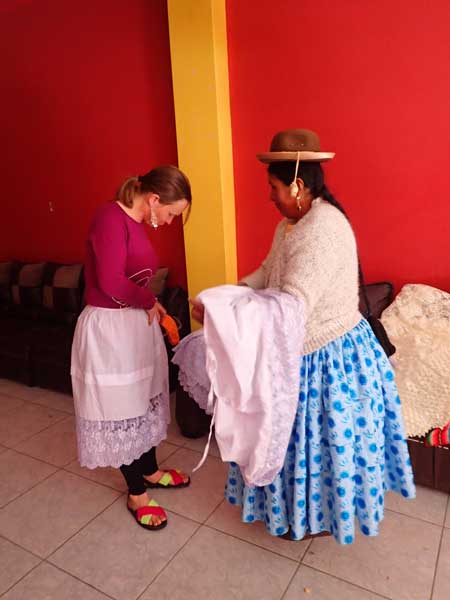 Petticoat 1 of 6 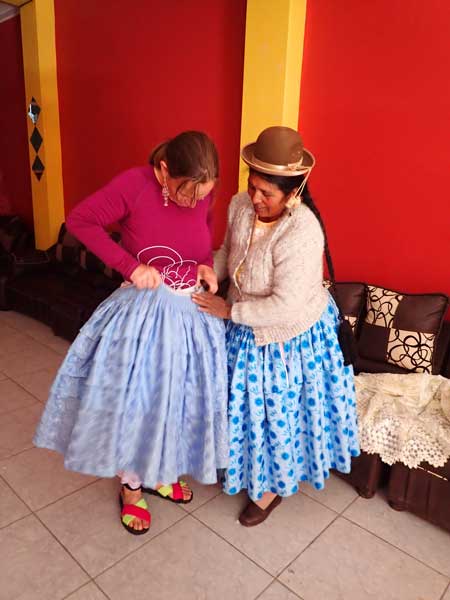 The pollera goes over the six petticoats  Mandatory plaits  Aymara Kath As we walked through the crowds in our Ayamra skirts and petticoats, Jolene and I received numerous compliments: "You are so beautiful!" called out onlookers, both men and women. There is something very refreshing about a society that still has norms of beauty completely different to western stereotypes. I would love to know what Aymara men make of the pale-skinned, bikini clad pin-up models above the tyre shop in Puno. It was ten in the morning, yet the beer was flowing. The unit of beer was a case of 12, rather than a bottle and the crates were piling up. The tradition is that the dancers buy a case for the sponsoring families, so Franco went off with Louisa to perform the duty. The downside was that the family then kept us supplied in beer for the rest of the day. You fill the plastic cup (there is only one) and pass the bottle to the person next to you, down the beer and pass the cup over. The trick was to join a large group with few bottles. The foam is spilled on the ground so Franco and I developed a technique where we only ever poured foam into the glass, otherwise we would have fallen over after the first half hour.  Louisa, Kath and Jolene The dancing wasn't organised as it had been in Platería, instead it was wild and chaotic, fuelled by alcohol. Franco was soon the favourite of the ladies and two large riotous women in pink didn't take "no" for an answer. 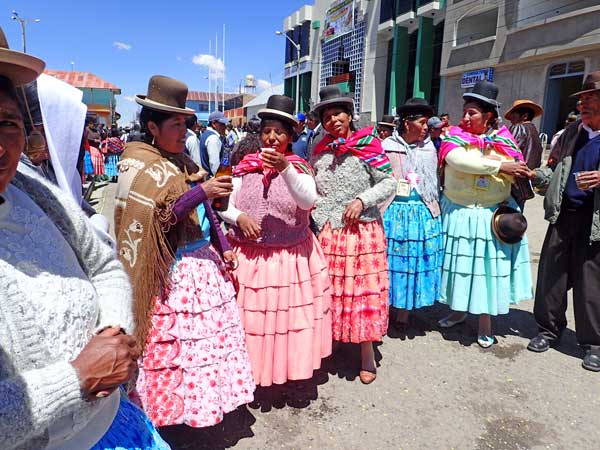 The ladies in pink  Jordan dancing with a lady  Young girls in pretty costumes The pan pipers blew, the drummers beat their drums, the drunks fell over, the sun beat down and still people danced but it was time for us to head back, the horses were waiting, keen to get home to their bowl of maize mash. 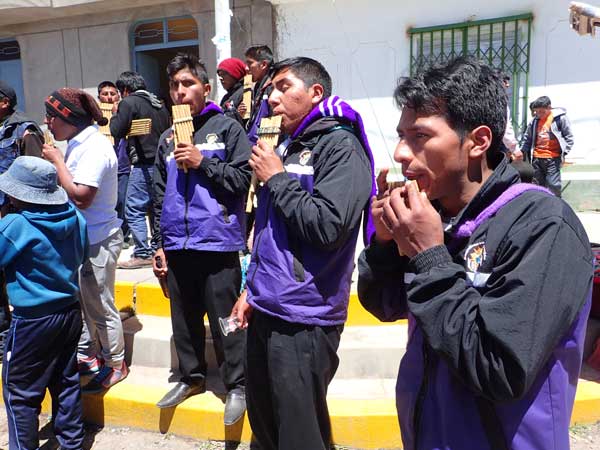 Pan pipers Before we could leave though (by now it was 4pm) we had to go to the homes of the sponsoring families, to eat soup and receive the obligatory box lunch. We managed to escape after two meals! 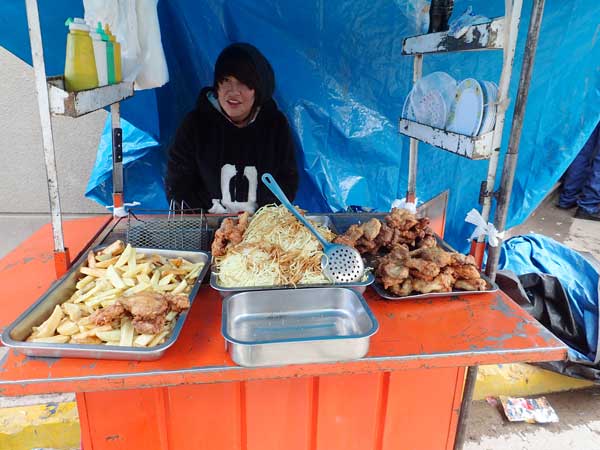 A food stall Saturday is Louisa's day off so we arranged to meet her in Acora. "See you at 9," she said. "But Louisa, we won't have finished with the horses by nine," I complained. "Or do you mean 9 Peruvian time?" I added, in a stroke of genius. Franco stayed behind to get some Pesda work down but when Jolene, Jordan and I arrived in Acora at 11am, Louisa was still at home in Puno. She arrived a couple of hours later, looking glum. Her sister had lost the key to the house at the market the day before so we couldn't get hold of the 'polleras' we had worn on Thursday. We watched the procession, a very formal affair with speeches in Aymara speckled with words in Spanish. The crowd seemed more urban with fewer people wearing traditional costume and there was a distinct lack of beer. Suddenly Louisa sent Cornelio off, his task was to find someone to cut the padlock on her sister's house door and retrieve the costumes so that Jolene and I could join the dancing. Cornelio rang thirty minutes later: mission accomplished ... only he forgot the bowler hats. Jolene and I were a little nervous, how would the packed crowd react to two 'gringas' in Aymara costume? A group of dancers made way for us to join the procession. 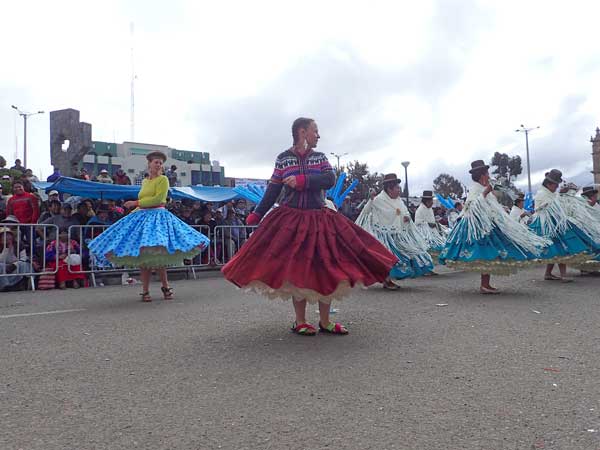 Jolene and Kath dancing - the more petticoat exposed, the better 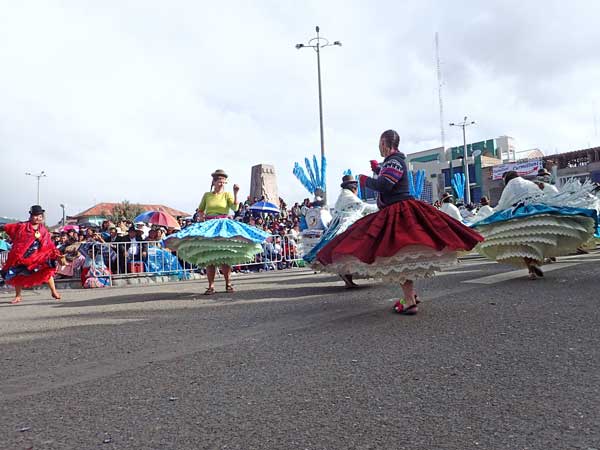 As Jolene and I twirled, the crowd cheered. Ladies in bowler hats waved and when we waved back, everybody clapped. Cameras flashed, it was exhilarating. I was short of breath, dancing at high altitude is exhausting. A lady dashed out of the crowd with a bottle of beer and a plastic cup. "You must drink. We are so pleased to see you dancing. Thank you." She said. 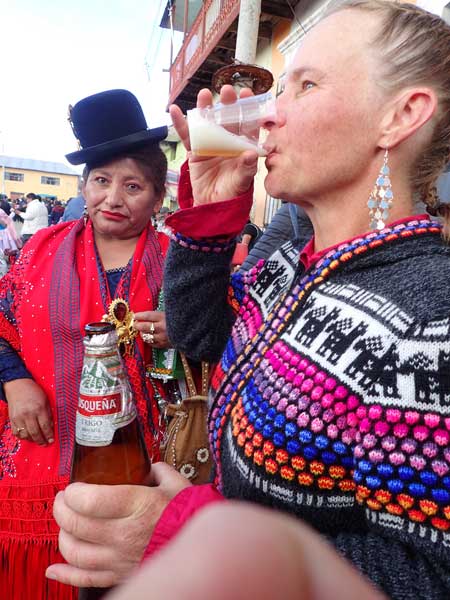 Kath bravely downing a glass of beer The procession ended and one of the groups of dancers invited us to drink beer. They were a business family living in Juliaca, the capital of the Peruvian altiplano, who return to Acora every year for the celebrations. 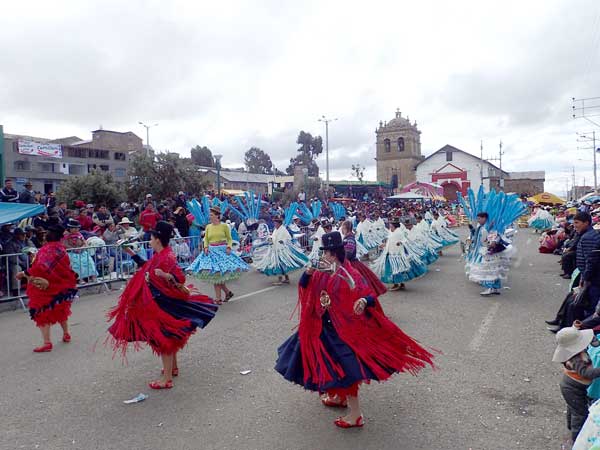 The dancers in red are the family from Juliaca 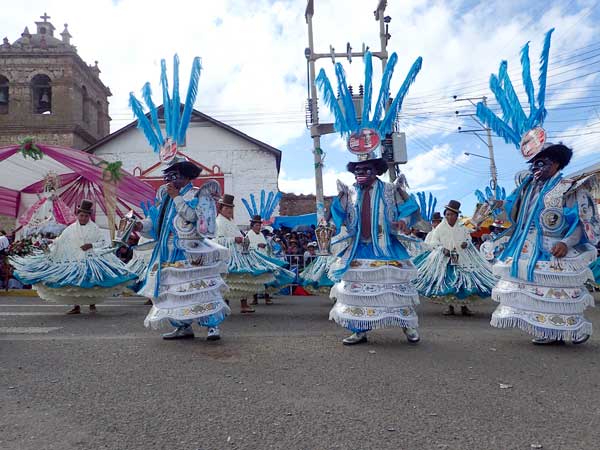 Colourful costumes We stayed away from Acora for the next few days but returned for the last day the fiesta, the bull fight. No bulls were harmed in the event but it is possible that several spectators died slipping off the cliffs from where we watched. The local guy Alex was remarkable, he could sprint faster than a bull but the guest 'toreador' from Columbia, in his sparkly suit, was a disappointment. He spent most of his time hiding behind the guard wall. We guessed he may have underestimated the effects of altitude on his abilities. 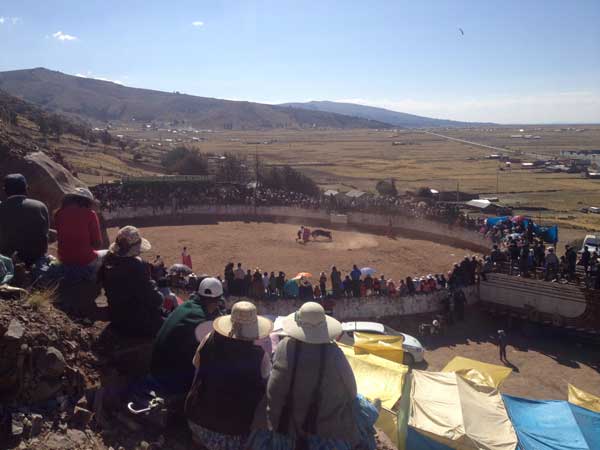 The bull fight Franco and I treated ourselves to a made on the spot ice-cream before heading back to Chucuito. 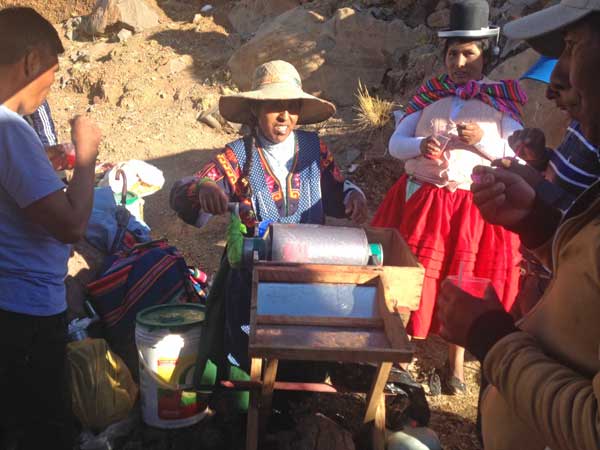 Hand-powered ice-cream machine |